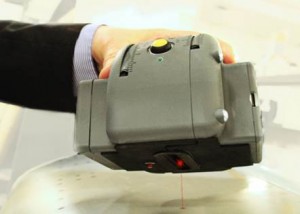An innovative Bristol business and the University of the West of England (UWE) have teamed up to develop a pioneering device which could reduce airlines’ fuel bills and cut their carbon footprints.
The unique hand-held scanner, the brainchild of UWE academics and concept design firm Intercede Ventures, can measure precisely how much dirt has accumulated on an aircraft’s surface and determine whether it increases drag. 
Operators can use the data collected by ECOTEC system to optimise aircraft cleaning routines and ensure their fleet is as aerodynamic as possible.
It is estimated that airlines using the instrument could cut their fuel bills by as much as 1% – a significant saving for major airlines.
One of the world’s largest charter airlines is trialling the patented system on six of its aircraft ahead of the product being launched onto the market this year.
Intercede worked with researchers from UWE’s Institute of Bio-Sensing Technology to develop the system, using the UWE team’s expertise in sensor system design, fabrication and evaluation. The university’s wind tunnels were used for early testing and calculations.
Intercede managing director Graham Mimms said the technology – which uses lasers, light beams and mirrors – also had applications in the automotive, marine, rail and wind turbine industries as they also use aero-dynamic surfaces.
“A clean aircraft is a more efficient aircraft but that’s not always been too easy to prove,” he said.
“We thought ‘If we can prove it, airlines would keep them clean and efficient’ and as a result more environmentally friendly.
“Engineers will soon be able to walk around the aircraft with our patented and industry-approved instrument to analyse which surface sections need cleaning to keep it in its most efficient state. If you clean it by applying an industry approved cleaning compound you will have an aircraft aerodynamically more efficient.
“We detect when it becomes beneficial to re-clean specific areas of the aircraft as degradation – increased drag – is not even across the aircraft surface. By doing this, we can keep the aircraft within an efficiency envelope.
“By following our protocols, airlines will be able to maintain the surfaces in a more efficient state. An aircraft can look clean to the eye but not be aero-dynamically at its best – our instrument can detect this.”
Airlines’ approach to cleaning their planes varies and, as washing a single aircraft can use more than 20,000 litres, has huge financial and environmental costs.
But Graham said the ECOTEC system could lead them to dry washing aircraft with environmentally-friendly cleaning products.
“What we are recommending is more labour intensive (dry washing) but the resulting efficiency can be greater. If carbon emissions can be reduced by reduced drag efficiencies, airlines may also be able to benefit from reduced taxes.”
Graham, who along with his two fellow founding directors have more than 100 years’ experience in the airline industry at senior managerial and director level, said his company decided to work with UWE because of its facilities, expertise and close ties with the aviation industry.
He said: “A big deciding factor was the fact UWE has considerable expertise in sensor technology development coupled with appropriate facilities, for example three wind tunnels. There is duel speed sub-sonic one and an ultra-sonic one. Using these was the basis of the initial research to prove that drag can be measured and could be related to the efficiency of the aeroplane.
“We also looked at the history of the university and the way it is supported by the big names in the aviation industry including aircraft manufacturers and aero engine suppliers. For us it had the right credentials for the technological aspects of what we are doing.”
The development of the surface analyser has been supported with £100,000 in grants from UWE’s Business Technology Centre, iNets South West and Innovation 4 Growth.
Investment firm Angels4Angels also recently backed the venture with £100,000 investment.
Graham said: “We are delighted to welcome the support and financial expertise that Angels4Angels brings to our project, enabling us to focus our efforts on further product development and marketing our carbon footprint reduction systems to international aviation and other markets.
“Through our collaborative working relationship with the international aircraft cleaning manufacturer Chemetall – Intercede Ventures will commence marketing its airline carbon footprint reduction aircraft surface management service in 2016 through Chemetall’s global aviation distribution network alongside its own marketing activities.”





























